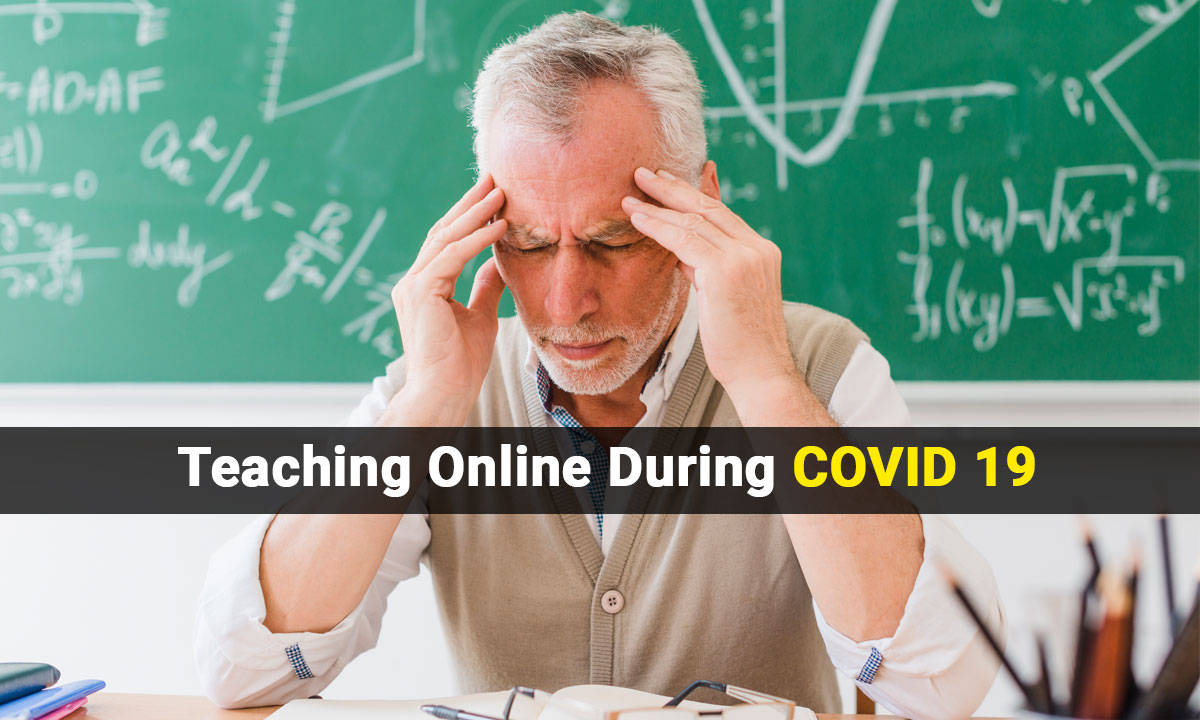In 2020, we saw a sudden shift in the field of education. Due to the COVID-19 pandemic, almost every school and college had to start conducting classes online. From kindergarten to post-graduate programs, everyone started attending virtual classroom sessions. It was a brand-new experience for students, teachers as well as parents.
Students were comfortable with the idea since they already spent a lot of time online. Teachers, on the other hand, were pushed out of their comfort zone. Many of them had spent years teaching in classrooms and often adapted their lectures according to the mood of the students. But in the online world, they could not interact with their students in the same way. They were expected to talk to only a screen. Even the new-age technology of video conferencing was alien to them.
If that was not daunting enough, many of them have started facing abuse during their sessions. One such case is of a 55-year old teacher in Gujarat. He invested his hard-earned money on a whiteboard and other supplies essential for online lectures. He was very nervous but forged ahead to be there for his students and set-up his lecture with the help of his daughter. When the online session began, an unknown ID joined the conference and started abusing him. He was caught off-guard. The other students began laughing at him. They found the foul language amusing. The teacher was too embarrassed to continue and ended the session abruptly.
Is this the future of education? Is this how future generations will treat their gurus? Should we just stand and watch respectable teachers get humiliated? Should teachers just accept this kind of behaviour which they cannot control since the virtual classroom has its restrictions? The answer is a big NO. Each one of us needs to speak up about such matters. We can all do out bit by spreading awareness and stopping such unacceptable behaviour.
By educating people of all ages around us we can alter this kind of shameful behaviour. Students with a conscience have an obligation to report their peers for such kind of actions. Teachers need to implement strict rules about conduct. Parents need to check on their child’s behaviour and keep their eyes and ears open to catch their mischief. If responsible students, teachers and parents join hands to fight this menace of online bullying we can hope for a better future. Here is a list of actions that can be done by each of those involved.
Do’s and Don’ts for Students
Responsible students who respect their teachers should act as role models for their classmates. They should talk to them with compassion about how their actions affect the morale of teachers. Every student should keep the following in mind while attending online sessions.
- Be punctual, positive and prepared.
- Mute your audio until you are asked to speak by the teacher or if you have a question.
- In case of technical issues help your teacher or fellow participants resolve it. Do not ridicule them.
- Sit in a quiet place and turn off all other devices. Do not check your phone during the class. Keep water and refreshments close to you if the session is long.
- If your peers are planning to cause a disturbance, try to get them to change their mind or report them to the principal.
- Do not partake in any unacceptable behaviour. Even laughing at your teacher is offensive.
- Make sure you follow all the instructions shared by your teacher. Every teacher might have a different set of instructions.
- Do not judge your classmates on their outfit, house etc.
- Pay attention and make notes. Submit assignments on time.
- Avoid slang while speaking or typing. Refer to your teacher as Sir or Madam only.
Do’s and Don’ts for Teachers
Teachers need to have a clear set of rules defined for their class. They can assess the overall behaviour of a class and tweak their rules accordingly. However, what is acceptable and what is not should be explicitly mentioned. The consequences of breaking the rules should also be clarified.
- Be prepared. Test your equipment and set-up before the actual session. Get technical help if needed from your family members or students.
- Prepare a clear set of instructions for your students of how you expect them to behave. Send this by email and also send a copy to their parents.
- Record each session so that the students are on their best behaviour.
- Approach responsible students to get feedback about your session.
- Make the session interactive with surprise games and quizzes. Ask more questions.
- Form groups and give tasks. This will help the students to bond with each other.
- Be patient with students. Give them the benefit of doubt. Some may have family problems which might impact their attention during sessions.
- Don’t overburden students. They might have additional responsibilities at home. The pandemic might also be affecting their mental health. Be kind.
- Do not tolerate bad behaviour. First, give a warning. If things don’t improve escalate the matter and share the consequences with the student, parents and the principal.
Do’s and Don’ts for Parents
Parents have a vital role to play in online education though they are not directly involved in the virtual classroom sessions. They need to keep an open mind regarding their children as well as the teachers and help both the parties.
- Motivate your child to attend online classes with the same enthusiasm as offline classes.
- Ensure they have all their basic needs taken care of so that they can focus properly on their lessons.
- Be aware of their timetable and assignments that need to be submitted.
- Define the consequences they will have to face in case they don’t follow instructions set by you or the teacher. Inculcate discipline.
- Make sure they have a routine in place so that they don’t feel tired and get enough sleep.
- Help them with their homework and assignments if and when possible.
- Keep having open positive conversations about the pandemic so that they feel safe and secure.
- Observe their moods and make a note if they start sleeping excessively. Be open to seeking help for mental health issues.
- Monitor their behaviour during online sessions and talk to them if you feel they are not behaving respectfully.
- Check with their teachers about their progress and behaviour. Listen to the teacher with an open mind and be kind to them.
- Try to be mindful of the household chores assigned to the children based on their load of homework and assignments.
- Try to uplift their spirit with fun and games at home so that they don’t feel overwhelmed with classes.
If we all start implementing these instructions, we can control the threat of online bullying of teachers. The future is online and we need to start learning the code of conduct of online behaviour. They are the new ‘good manners’ of the ‘new normal’.
If you are a teacher/ educator then apply for Educator Excellence Award on www.vedant.org.in/awards

